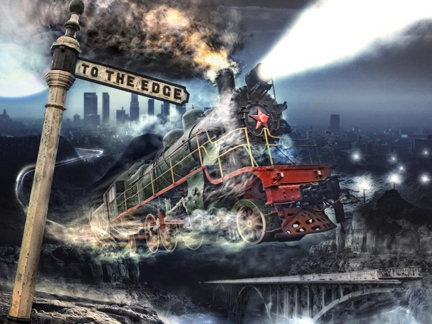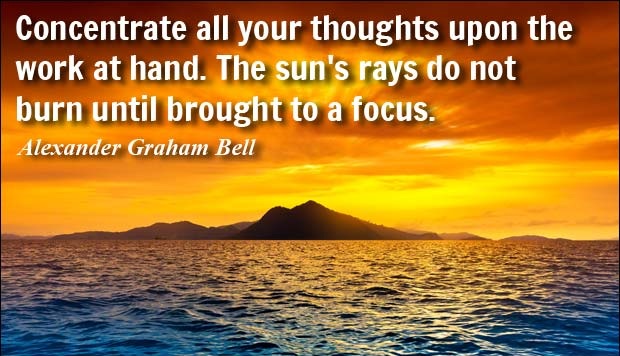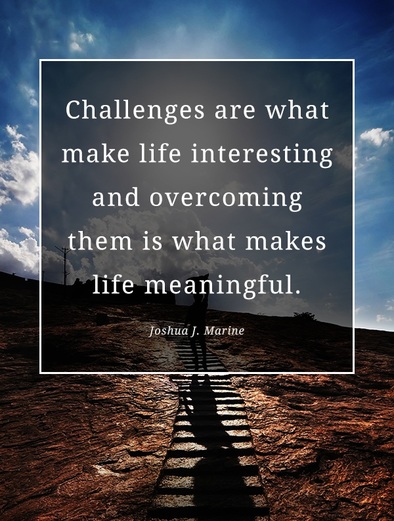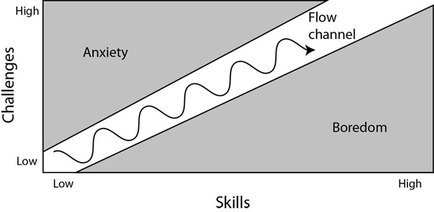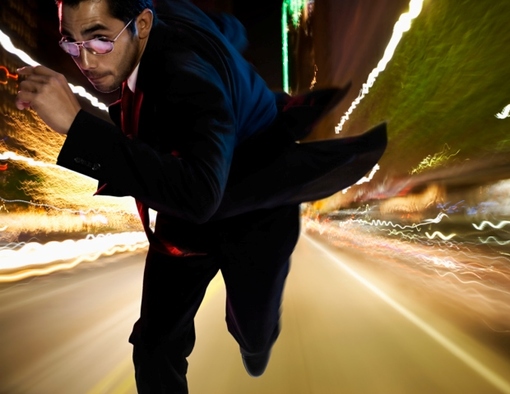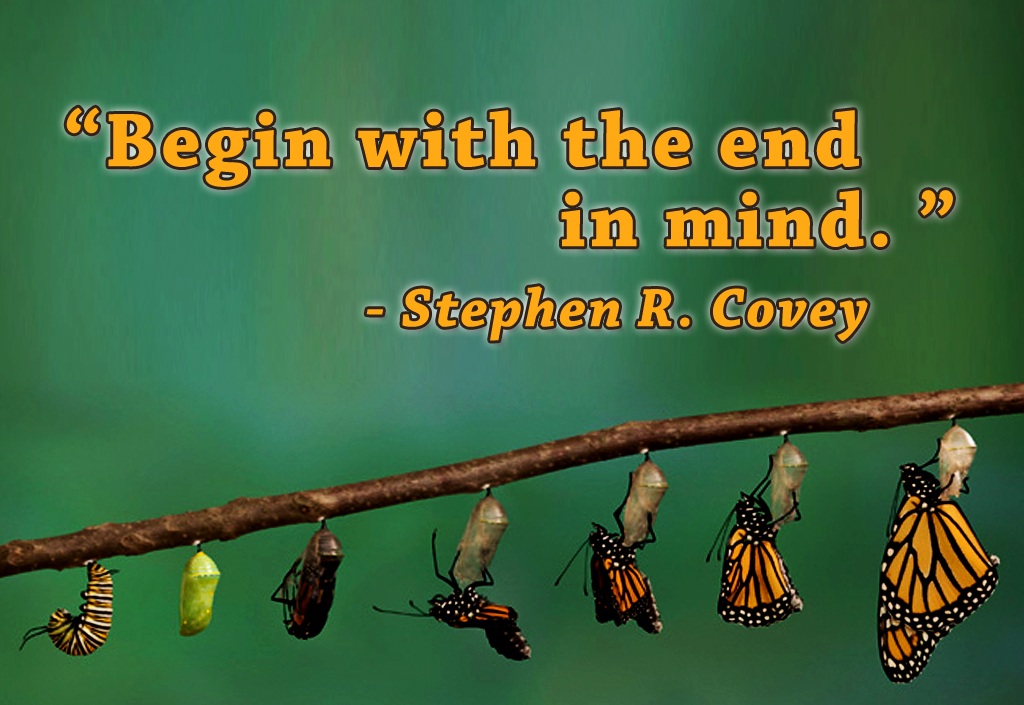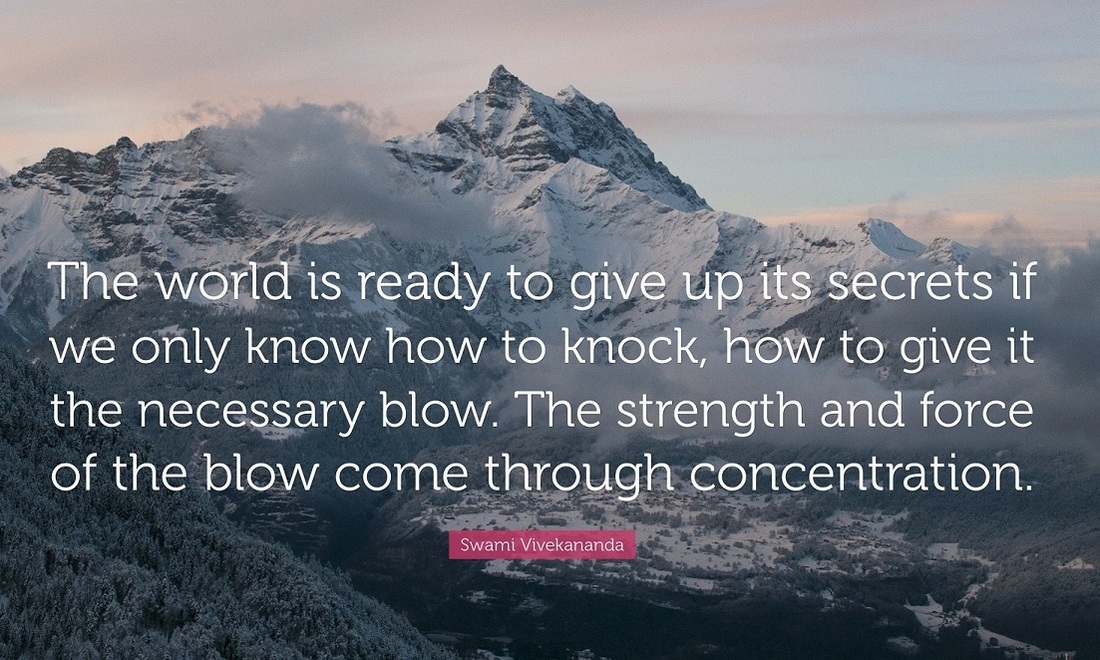|
|
|
Before proceeding, I would highly recommend checking out the first part of this lesson - as it builds off of that article's core fundamentals. Doing so will allow you to obtain the most value out of this experience. Check it out here: Part 1
If time is invested in ordering consciousness, one can train the mind to seek engagement and naturally flow into any task at hand. In this state, the mind exhibits a sense of momentum similar to that of a speeding train. Its focus and attention bleed into the present moment, and no extraneous thoughts or mental resistance could ever impede progress; immersion and massive action become paramount. |
In this series’ previous lesson, we learned that, just like the universe, the mind naturally tends towards disorder. It is programmed to maximize output while minimizing effort – regardless of our deepest desires. Hence, if gradual progress demands concerted effort, the mind is inclined to resist action. Instead, it focuses on excuses and extraneous thoughts, which fragment our consciousness. Unfortunately, this leaves the mind in a more disordered state and sacrifices personal control, making it immensely difficult to project attention and energy into the present moment. If time is invested in ordering one’s consciousness, however, then this process may be reversed; one can train the mind to seek engagement and naturally flow into any task at hand. In this state, the mind exhibits a sense of momentum similar to that of a speeding train. Its focus and attention bleed into the present moment, and no extraneous thoughts or mental resistance could ever impede progress; immersion and massive action become paramount. Although the previous lesson extensively explored this optimal state’s benefits, we did not investigate activities which directly promote it. That is the main intention of this lesson; we’re going to further dissect this phenomenon, study and understand its main constituents, and identify activities which promote it. In doing so, the hope is to arm ourselves with the unlimited potential of knowledge and the success it breeds. After all, triumph flocks to those with the most effective and efficient assets, and no asset is as grand as knowledge.
|
|
In his book entitled “Flow: The Psychology of Optimal Experience”, Mihaly Csikszentmihalyi formally describes this phenomenon as a flow state – one of the most enjoyable experiences available to mankind. As the name implies, flow is an otherworldly state which facilitates harmony between our internal and external worlds. It allows the essence of who we are to effortlessly flow into the present moment, unencumbered by resistance and extraneous matters. For this reason, most notable achievements not only arise from this optimal state, but a sense of euphoria is awakened in the process. This is due to the fact that, while engaged in flow, a person is allowed to BE, in the truest sense of the word. Nothing within the mind is inhibited; rather, all creative forces are focused on the current experience, and the ease with which thoughts flow and evolve inspires a sense of freedom and liberation. In this sense, an ordered consciousness engaged in flow is no different than a bright sun in a clear sky. On a clear day, no clouds are present to impede the sun’s rays; they shine through brilliantly and reach their intended target. There is a direct, unhindered connection between the source and destination, and this light ultimately allows life to thrive – producing flourishing plants and the energy fueling this world. Similarly, flow structures a cloudy, disengaged mind into an orderly asset; it eliminates all diversions and resistance which consume our mental energy. As a result, attention flows seamlessly into the present moment, and there is a focused connection between the conceiving mind and its manifested creations. A person’s essence seeps effortlessly into the surrounding world, which becomes an extension of his or her soul. It is this state from which the most innovative creativity arises, giving birth to true ingenuity.
|
An ordered consciousness engaged in flow is no different than a bright sun in a clear sky. On a clear day, no clouds are present to impede the sun’s rays; they shine through brilliantly and reach their intended target. There is a direct, unhindered connection between the source and destination, and this light ultimately allows life to thrive.Similarly, flow structures a cloudy, disengaged mind into an orderly asset; it eliminates all diversions and resistance which consume our mental energy. As a result, attention flows seamlessly into the present moment, and there is a focused connection between the conceiving mind and its manifested creations. It is this state from which the most innovative creativity arises, giving birth to true ingenuity. |
When an activity presents a legitimate challenge, there is hardly any room for distraction or error. The mind must focus all of its energy and resources on the current task; no space exists for extraneous thoughts. As a result, the mind becomes acclimated to full, immersed presence – leading to a highly organized consciousness. However, the level of challenge must certainly be tailored to an individual’s given skill level. Otherwise, one may quickly lose interest and struggle to maintain focus. The challenge must adapt as a person’s skill level develops to maintain interest. In this sense, flow activities present an appropriate balance between challenge and skill; this is generally found at the boundary separating boredom and anxiety – the point at which a fully invested consciousness is essential. It is the flow channel depicted in the graph above. |
Since it fuels such an optimal experience, this phenomenon of flow is also no different than a doorway towards success. However, to unleash its potential, we must first figure out how to both locate this doorway and also unlock its limitless potential. This is accomplished by identifying its underlying characteristics and understanding why they promote flow. Such knowledge allows us to seek out flow in all that we do and invite its innumerable benefits into our lives; it is the guiding light which beckons us towards victory. Fortunately, in his book, Mihaly identifies 8 characteristics inherent in all flow activities, which we will now explore. We should all always strive to understand these characteristics and seek out their nurturing qualities; they are the keys essential for success and optimal experience:
1.) A Challenging Activity That Requires Skill: As explained above, flow states always stem from an ordered consciousness, and a seamless connection between the mind and reality usually exists. In this state, the mind is impervious to resistance; all attention is focused on the present moment, and mental resources flow freely into any given task at hand. This is the essence of flow and signifies its core qualities, but it certainly begs an important question: what could possibly inspire this state? The answer lies in challenging activities demanding skill and concerted effort. When an activity presents a legitimate challenge, there is hardly any room for distraction or error. The mind must focus all of its energy and resources on the current task; no space exists for extraneous thoughts. As a result, the mind becomes acclimated to full, immersed presence – leading to a highly organized consciousness. However, the level of challenge must certainly be tailored to an individual’s given skill level. Otherwise, one may quickly lose interest and struggle to maintain focus. For example, if a child is learning to play tennis, setting up a match with a professional athlete makes no sense; the challenge would be too immense to hold the child’s attention, as action would be deemed futile. A more appropriate challenge may entail hitting the ball over the net and within the court’s lines. However, as the child’s skill begins to develop, this initial challenge would eventually grow old and boring, and such boredom – which poses almost no need for concerted effort – would inevitably lose the child’s focus. So, the challenge needs to adapt as a person’s skill level develops; otherwise, the need for focused attention ceases to exist, and room for extraneous thoughts arises. In this sense, flow activities present an appropriate balance between challenge and skill; this is generally found at the boundary separating boredom and anxiety – the point at which a fully invested consciousness is essential. |
|
2.) The Merging of Action & Awareness: As discussed above, when an activity presents the appropriate level of challenge, it also demands concerted effort. A person’s awareness must be completely absorbed by the activity, and, hence, no psychic energy remains to focus on extraneous thoughts. In this state, consciousness becomes inseparable from the activity itself, and a seamless connection arises between the mind and its immediate focus. Gradually, all mental resources and energy begin to flow effortlessly into the task at hand, without much resistance. At this point, both action and awareness cease to exist as separate entities; they become one. Focusing awareness on the task at hand fully projects your essence into the activity, as it becomes an extension of your soul. Such immersion is at the heart of our favorite activities and elicits almost automatic action. For example, consider flow inherent in a game of soccer. During a match, a soccer player in action intently focuses on the ball and surrounding opponents. He / she is constantly calculating the ball’s trajectory, predicting other players’ actions, and planning out active strategies. As a result, hardly any mental energy is available to contemplate irrelevant matters; the situation demands clear, unobstructed focus. Yet, at the same time, all of these actions seem to flow into the moment almost automatically. The player does not recognize these thoughts racing through the mind; rather, they simply happen and inspire action. In this sense, nothing exists in the moment aside from the game. The soccer player becomes as much a part of the activity as the game is a part of his / her awareness. Such engagement is most likely the source of enjoyment inspired by flow. Nothing is quite as fulfilling as the merging of awareness and action; it makes a person feel alive and inspires a sense of meaning and purpose.
|
While immersed in flow, a person’s awareness must be completely absorbed by the activity, and, hence, no psychic energy remains to focus on extraneous thoughts. In this state, consciousness becomes inseparable from the activity itself, and a seamless connection arises between the mind and its immediate focus. Gradually, all mental resources and energy begin to flow effortlessly into the task at hand, without much resistance. At this point, both action and awareness cease to exist as separate entities; they become one. Focusing awareness on the task at hand fully projects your essence into the activity, as it becomes an extension of your soul. Such immersion is at the heart of our favorite activities and elicits almost automatic action. |
As Stephen Covey once said, we must all “begin with the end in mind.” Before action is even possible, one needs to know where he / she is headed and how to get there. Without that direction, all behavior is inherently erratic, and the mind has nothing to focus its attention upon – falling into disarray. When clear goals are first established, however, a person has a clear sense of direction, and all action rises out of purpose and clear intent. This focuses attention on the current goal, allowing mental resources to flow freely into the present moment. |
3.) Clear Goals & Feedback: As Stephen Covey once said, we must all “begin with the end in mind.” Before action is even possible, one needs to know where he / she is headed and how to get there. Without that direction, all behavior is inherently erratic, and the mind has nothing to focus its attention upon – falling into disarray. When clear goals are first established, however, a person has a clear sense of direction, and all action rises out of purpose and clear intent. This focuses attention on the current goal, allowing mental resources to flow freely into the present moment. Similarly, consistent feedback is another essential quality of flow. When provided, it drastically diminishes worry and anxiety regarding performance, because a person is able to judge whether action is properly aligned with desired outcomes. As a result, mental resources may be further invested into the current activity, as opposed to self-evaluation. This obviously promotes a more organized consciousness, allowing its assets to flow freely into the present moment. Such qualities explain why school is a common source of flow. For example, while attending school, a person knows exactly what must be done; there are clear, concise goals intended to guide a student towards mastery. Courses and curricula are structured to disseminate knowledge, and the student’s challenge is to demonstrate competency in various subject areas. More directly, the goal is to obtain an A and understand course material. As a result, there is a target to aim at, and this allows the student to focus attention and mental resources. At the same time, all exerted effort is always accompanied by feedback. The student receives grades on all submitted work, and such evaluations offer the opportunity to tweak performance. Thus, resources may be invested in readjusting one’s approach, not in worrying over its effectiveness. In the long run, these qualities help to facilitate a sense of immersion which has always been fulfilling; it’s why some students spend most of their lives in academia and find it difficult to leave.
|
|
4.) Concentration on the Task at Hand: Throughout life, we are all typically the prey of anxious thoughts which invade our consciousness. We question our ability to obtain food, seek out shelter, and meet basic needs on a daily basis. Of course, these natural inclinations are conducive from an evolutionary standpoint; they ultimately maximize our rate of survival. However, at the same time, these recurring thoughts also scatter our attention and awareness, making it difficult to take control of mental resources. This often leads to anxiety and draws attention away from our underlying purpose – contributing to an overall unpleasant experience. When a person is fully immersed in a flow activity, however, the opposite situation arises. Since these tasks always pose an appropriate challenge, one is compelled to completely focus on the task at hand. The mind must be directly connected to the activity, leaving no room for irrelevant thoughts. This naturally inspires an ordered consciousness and pristine concentration. Fortunately, one by-product of this reality is the ability to escape anxious thoughts. The mind is completely immersed in the activity and temporarily forgets our daily worries and obligations. Such a sensation is captured perfectly by this mountaineer’s words (take from Flow: The Psychology of Optimal Experience): “When you’re climbing you’re not aware of other problematic life situations. It becomes a world unto its own, significant only to itself. It’s a concentration thing. Once you’re into the situation, it’s incredibly real, and you’re very much in charge of it. It becomes your total world.” This is why flow activities are typically described as optimal experiences. They allow a person to BE and exist in the present moment, releasing them from the demands of the future and wounds from the past.
|
Since flow activities always pose an appropriate challenge, one is compelled to completely focus on the task at hand. The mind must be directly connected to the activity, leaving no room for irrelevant thoughts. This naturally inspires an ordered consciousness and pristine concentration. Fortunately, one by-product of this reality is the ability to escape anxious thoughts. The mind is completely immersed in the activity and temporarily forgets our daily worries and obligations.This is why flow activities are typically described as optimal experiences. They allow a person to BE and exist in the present moment, releasing them from the demands of the future and wounds from the past. |
The challenges inherent in flow may appear to restrict one’s control over life – to contest the ability to survive. However, beneath the surface, they actually offer the opportunity to rise above calamity and take control, and partaking in flow generally increases a person’s likelihood to survive. Here’s why. When a flow activity poses a challenge, it invites a person to continually sharpen the sword – to elevate their skill set to the next level. A sense of evolutionary pressure is always demanding more, and this inevitably carves a person into a survivor. In essence, the challenge is to align one’s skills and assets with the activity’s underlying rules, and a proper alignment gives a person full control over the situation. He or she dictates the activity’s outcome; nothing else plays a role in paving out the final result. |
5.) Paradox of Control: Sometimes, a flow activity actually places us in a more dangerous situation. For example, rock climbing introduces a new threat into one’s life – the possibility of falling and dying. In this sense, the challenges inherent in flow may appear to restrict one’s control over life – to contest the ability to survive. However, beneath the surface, they actually offer the opportunity to rise above calamity and take control, and partaking in flow generally increases a person’s likelihood to survive. Here’s why. When a flow activity poses a challenge, it invites a person to continually sharpen the sword – to elevate their skill set to the next level. A sense of evolutionary pressure is always demanding more, and this inevitably carves a person into a survivor. In the case of rock climbing, this is taken to an extreme level. Climbers are compelled to hone their skills and talents until the likelihood of error falls as close to zero as possible; otherwise, the activity could literally lead to death. They train to increase body strength, fine-tune climbing strategies, and work on their footing and grip. In essence, the challenge is to align one’s skills and assets with the activity’s underlying rules, and a proper alignment gives a person full control over the situation. For instance, a climber who has cultivated a competent skill set exudes confidence, relaxation, and control. He or she dictates the activity’s outcome; nothing else plays a role in paving out the final result. In this way, a flow activity may certainly pose a dangerous threat, but it also offers the opportunity to take complete control and dictate outcomes. It is precisely this fight for control which evokes fulfillment and hardens a person's perseverance.
|
|
6.) Loss of Self-Consciousness: In all forms of life, there is a common need for social acceptance, which significantly motivates behavior. In particular, humans are on a perpetual search for companionship, and love is known to inspire a wealth of action. As a result, this innate desire to fit in has bred a self-conscious species. One is always conscientious of his or her projected self-image: am I good enough; is my behavior weird or out of place; will they accept me for who I am? As you can imagine, this paradigm obviously consumes significant mental energy - producing an erratic, disordered mind. If one is engaged in flow, however, the activity presents a level of challenge demanding all available psychic energy. Hence, there are no longer sufficient resources available for being cognizant of one's sense of self; the entire concept ceases to exist in the moment. This can be quite a liberating experience, as it releases a person from anxiety's constraints; the mind rises up above menial worries and exhibits an otherworldly sense of freedom. This is demonstrated through the words of a famous ocean navigator (taken from Flow: The Psychology of Optimal Experience): "So one forgets oneself, one forgets everything, seeing only the play of the boat with the sea, the play of the sea around the boat, leaving aside everything not essential to that game." Furthermore, this sense of unrestricted freedom also seems to unite a person with his or her surroundings. One's thoughts, actions, and words begin to bleed directly into reality, and the activity becomes an extension of that person's soul - a projection of his or her talents, skills, and underlying essence. In this way, the activity allows a person to become more than what he or she currently is. You transcend beyond what you once were as you grow into a more complex entity; the "self" inevitably expands its boundaries. For instance, this sense of expansion is generally observed in the arts. As artists produce their creations, they pour their entirety into the work of art; it becomes more a reflection of the artist in that moment - than a mere piece of art. In the end, that artist's soul extends into the artwork, and the entire experience transforms what the artist once was. It leaves the person both with a clearer understanding of what he or she is and an optimized ability to face challenges. This is why all art has been such an attractive activity for decades; it relieves a person from daily obligations and expands his or her conception of self.
|
While engaged in flow, there are no longer sufficient resources available for being cognizant of one's sense of self; the entire concept ceases to exist in the moment. This can be quite a liberating experience, as it releases a person from anxiety's constraints; the mind rises up above menial worries and exhibits an otherworldly sense of freedom. Furthermore, this sense of unrestricted freedom also seems to unite a person with his or her surroundings. One's thoughts, actions, and words begin to bleed directly into reality, and the activity becomes an extension of that person's soul - a projection of his or her talents, skills, and underlying essence. In this way, the activity allows a person to become more than what he or she currently is. You transcend beyond what you once were as you grow into a more complex entity; the "self" inevitably expands its boundaries. |
When a person is fully immersed in a flow activity, the inherent challenge leaves no room for the conception of time. Minutes bleed into hours, and time seems to effortlessly slip away - as flow takes over the mind. |
7.) The Transformation of Time: When a person is fully immersed in a flow activity, the inherent challenge leaves no room for the conception of time. Minutes bleed into hours, and time seems to effortlessly slip away - as flow takes over the mind. In this state, there is no need to fixate on a task's length or temporal demands; there is only the task itself and a person's immersed consciousness, nothing more. For this reason, such a quality is not only desirable but also redemptive; it relieves a person of societal pressures and induces a serene relaxation. One no longer struggles to find the time for tasks; rather, attention is completely absorbed by the task at hand - evoking feelings of both exhilaration and euphoria. This is why it's so easy to lose track of time when occupied by favorite activities; one's consciousness focuses so intently on the present that no room exists for even considering time's passage. You simply flow into the task, unencumbered by extraneous thoughts or considerations.
|
|
8.) An Autotelic Experience: Unlike most modern tasks, a flow activity is an end in and of itself. It is intrinsically rewarding and completely detached from exterior influences. For this reason, most people participate in flow activities for the sole sake of participating; they never do so in pursuit of ulterior motives or material possessions - such as money, love, or success. As a result, it naturally awakens an otherworldly, optimal experience - one unrivaled by anything else in the world. This is due to the fact that, when a person acts for the sole sake of acting, he or she becomes completely present. Nothing consumes the person's awareness, and his or her entirety flows effortlessly into the activity. In a sense, the person becomes a part of the task in the process, and every single action feels appropriate - as if the person was born specifically for that moment itself. This principle is elegantly portrayed in most modern lifestyles. For example, most people unfortunately feel trapped in a dead-end job; they despise what they work on, fail to see the beauty surrounding them, and lose their entirety in the process. This reality usually haunts these people; they question the source of their situation as it gradually fuels their final demise. However, what they fail to realize is that their downfall was crafted from the beginning. After all, they personally chose to detach their actions from the activity itself; they were not working to work, as an end in and of itself. Rather, they worked for ulterior motives and external means - such as a salary and the possessions it may grant; they ultimately detached what they do from what they want. This is - and ALWAYS will be - a trap in and of itself, because we can never get enough of what we truly do NOT want. You can earn as great of a fortune as you want by working a job you despise, but it will NEVER be enough. You will always feel incomplete and cheated, because you cease to live in order to obtain it; you bottle up who you are, in exchange for insignificant pieces of paper. If you act to act and work to work, however, your experience will flourish into a blessing, and you will learn that work is - and was always intended to be - nothing more than play. Your actions will directly manifest what you truly want, and all intention eventually begins to yield fulfillment. Your life becomes an autotelic experience at that point, and the phenomenon of flow will breed a rich, rewarding, and happy lifestyle.
|
A flow activity is an end in and of itself. It is intrinsically rewarding and completely detached from exterior influences. For this reason, most people participate in flow activities for the sole sake of participating; they never do so in pursuit of ulterior motives or material possessions - such as money, love, or success. As a result, it naturally awakens an otherworldly, optimal experience - one unrivaled by anything else in the world. This is due to the fact that, when a person acts for the sole sake of acting, he or she becomes completely present. Nothing consumes the person's awareness, and his or her entirety flows effortlessly into the activity. In a sense, the person becomes a part of the task in the process, and every single action feels appropriate - as if the person was born specifically for that moment itself. |
Like our content? Share it with your friends!
Or join the discussions on our community forum!


